It was on Jan. 3, 1973, when after being sworn in as the 32nd mayor of Vancouver, Art Phillips gave an inaugural speech that remains one of the most visionary of any local civic leader.
It was just 12-and-a-half pages written on a manual typewriter and, among other groundbreaking initiatives, the speech spelled out how Mayor Phillips intended to make city hall function better.
I wonder if he were alive today how Phillips would perceive what is happening in the city council chamber where he once presided.
In spite of the advent of a video streaming service installed years ago, live ātweetsā from the city clerk on council proceedings and a gazillion pages of documents archived online, city hall in some ways has never been more opaque than it is in 2019.
In fact, it is likely as a result of the accessibility of digital media (and reduced burden of printing paper documents) that staff are compelled to provide as much detail as possible in reports.
While it is a good thing that citizens (and city council members) can just pull out their smart phones to access the preponderance of reports and presentations on the cityās website, when does the amount of information become counterproductive?
When in office, Phillips aimed to improve public engagement by scheduling public hearings in the evening, and by establishing an information booth on city hallās ground floor.
Today, he might appoint a āClarity Czarā to help cut through the noise.
The responsibility for the amount of material councillors need to absorb falls not only on city staff, but also mayor and council, who churn out new motions with complete abandon.
It is no wonder that city councillors table so many initiatives for staff to report back on. Councillors see how much media attention the motions elicit, which in turn builds their profile for the next election campaign.
Profile raising, like fundraising, is the oxygen of politics.
When I think back to the dozens of candidates that ran for council, I wonder how many of them would relish the actual workload councillors face.
It is not unusual for a council āpackageā (including the meeting agenda, motions and materials provided by staff) to be well over 1,000 pages long. But preparing for meetings is only just part of the role of a city councillor.
There are the innumerable 14-hour days for public hearings, council and committee meetings. Councillors also have all their commitments outside of city hall, such as meetings involving Metro Vancouverās board and committees, ceremonial responsibilities, or just meeting with constituents.
Time management is not the only skill you need to hold office, either. You have to quickly get up to speed on multiple disciplines such as municipal budgeting, engineering, planning, social development, the arts and land use in order to make an informed decision during a vote.
Just recently I downloaded a council report on clothing donation bins, a subject I have deliberated upon in previous . At 21 pages, it was relatively lean as staff reports go, but it could have made its point in two pages or less.
Thereās a rule of thumb often used when developing a briefing document for a provincial or federal cabinet minister ā keep it simple. Use plain language instead of jargon, and do your best to summarize recommendations up front. All the additional detail will follow if required.
While reports to council generally follow this format, even greater effort could be made to simplify these materials.
Not to pick on one topic in particular, but a recent presentation to council contained 45 slides about child care. An important issue for sure ā especially for the three councillors with children at home. But is council expected to reasonably grasp every detail when it has so many other decisions to make?
There's an old saying that the more you say the less people hear. The same can be said about the amount of content being generated at city hall.
We will never go back to manual typewriters and paper-based presentations, but it might be worth embracing some of the brevity and clarity of Phillipsā time in office.



